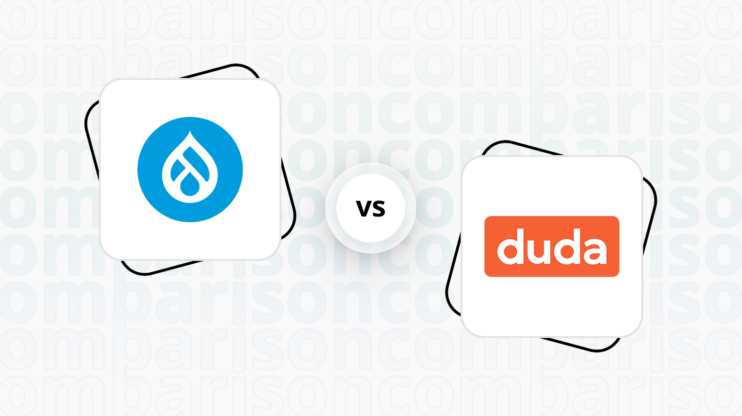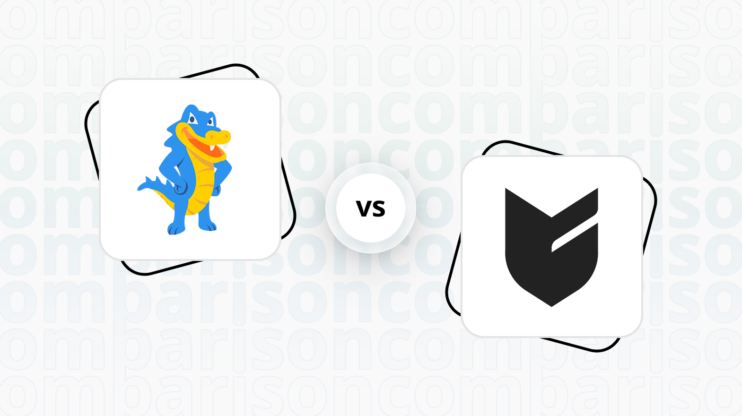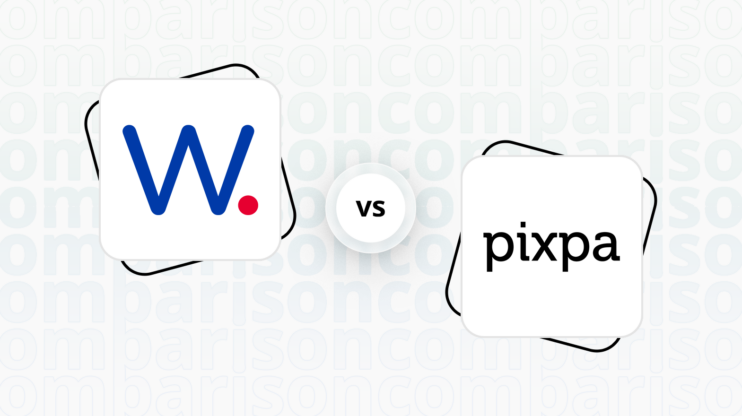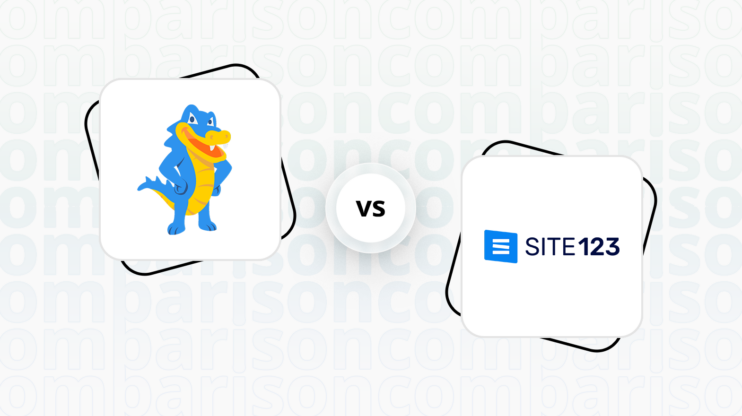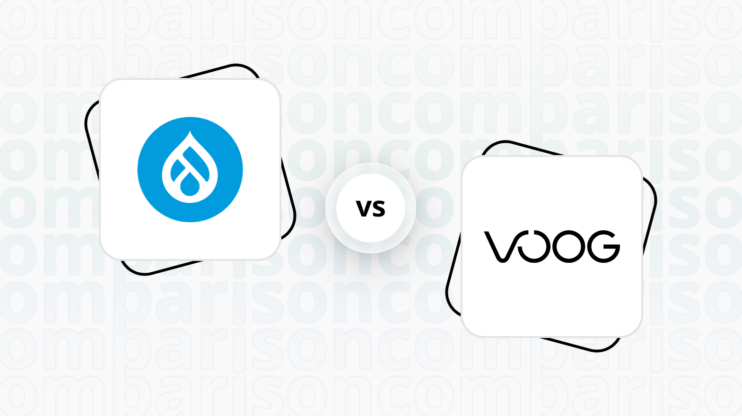Final verdict
Web.com and Sellfy both offer unique advantages, but they cater to different user needs and preferences.
-
Web.com (Overall Grade: 5.8/10)
is a versatile website builder aimed at users without coding expertise. It provides a drag-and-drop interface, a variety of templates, and essential ecommerce capabilities. Web.com is ideal for users looking to create a mobile-responsive website with SEO tools and analytics features. However, it may require intermediate web design skills to fully utilize its features. -
Sellfy (Overall Grade: 6.0/10)
is tailored for creators looking to sell digital, physical, subscription-based, and print-on-demand products. It offers a user-friendly interface, quick setup, and comprehensive ecommerce tools, making it perfect for those without advanced technical skills. Sellfy excels in simplifying the ecommerce process and providing tools to manage, market, and scale an online business effectively.

|

|
|
|---|---|---|
|
Design functionalities & templates |
6.4 |
5.2 |
|
Ease of use |
6.4 |
7.8 |
|
Ecommerce |
6.3 |
6.8 |
|
Website Editors |
6.6 |
6.8 |
|
Product testing options |
0.2 |
7.3 |
|
Price |
7.4 |
7.9 |
|
Hosting quality |
5.9 |
7.3 |
|
Website speed optimization |
5.8 |
5.4 |
|
Plugins and integrations |
6.7 |
6.7 |
|
Marketing features |
7.0 |
7.1 |
|
Customer support |
7.3 |
5.8 |
|
Security |
7.6 |
7.2 |
|
AI capabilities |
7.3 |
0 |
|
User Management |
5.2 |
2.0 |
Best for ecommerce
 6.3
6.3
 6.8
6.8
Verdict
: Web.com is suitable for general website building with ecommerce capabilities, while Sellfy is more specialized for creators selling a variety of products.
-
Web.com
: This platform is designed for users without coding expertise, offering drag-and-drop functionality and a selection of pre-built templates. It includes essential ecommerce features like product listing, marketing tools, and payment gateways integration. However, when comparing Web.com vs Sellfy, Web.com may not be as specialized for ecommerce, scoring 6.3 in this category. -
Sellfy
: Tailored for creators, Sellfy supports a wide array of products including digital, physical, and subscription-based items. It offers a user-friendly interface and comprehensive tools for managing and marketing an online store. Sellfy scores 6.8 for ecommerce, making it a slightly better option for those focused on selling a diverse range of products.
Best for informational & business websites
 6.5
6.5
 5.7
5.7
Verdict
: Web.com is better suited for informational and business websites due to its broader range of templates, mobile responsiveness, and comprehensive customer support. Sellfy, while strong in eCommerce, is less ideal for purely informational sites.
-
Web.com
: Web.com offers a user-friendly platform with drag-and-drop functionality and a variety of pre-built templates. It emphasizes mobile responsiveness and includes SEO tools to improve online visibility. With a score of 6.5, Web.com is a solid choice for users looking to create and manage informational websites with ease. -
Sellfy
: Sellfy is primarily an eCommerce platform tailored for creators selling digital and physical products. While it offers a simple interface and quick setup, its focus on eCommerce makes it less suitable for purely informational websites. With a score of 5.7, Sellfy is better for users who need eCommerce capabilities rather than just informational content.
Detailed comparison
Design functionalities & templates
Design FunctionalitiesRepresents how well each platform allows for creative design and customization of websites.Score Components:
- Template Variety (30%): Range and quality of design templates.
- Customization (30%): Flexibility and options for design alterations.
- User Interface (20%): Ease and intuitiveness of the design process.
- Responsiveness (10%): Adaptability to different devices and screen sizes.
- Innovation (10%): Unique design features and tools.
 6.4
6.4
 5.2
5.2
Winner: Web.com.
If you’re looking for a platform that offers a wider variety of templates and more customization flexibility, Web.com is the preferred choice.
Web.com offers over 100 website templates designed to cater to a broad spectrum of industries and personalization needs. These templates are structured to be straightforward in customization, allowing users to easily adapt their chosen designs to suit their unique brand identity through the platform’s editor.
Compared to Web.com, Sellfy provides a collection of design templates through its theme store, located in the Store Customizer. Users have the option to preview these themes before applying them to their websites. As of the latest information, Sellfy offers five main theme options: Lumiére, Noir, Savant, Idée, and Mode. These themes cater to various aesthetic preferences and can be published to go live on a user’s website after selection and customization.
Get a head start on website creation with AI
Create a custom website tailored to your business needs 10X faster with 10Web AI Website Builder!
Ease of use
Ease of useReflects the platform’s overall user-friendliness.Score
Components:
- Learning curve (40%): Quickness and ease of getting started.
- Interface design (30%): Simplicity and intuitiveness of layout.
- User guidance (20%): Quality of tutorials and support.
- Flexibility (10%): Adaptability to various user skills.
 6.4
6.4
 7.8
7.8
🏆 Winner: Sellfy
. With a score of 7.8, Sellfy is more user-friendly than Web.com, which scored 6.4. Sellfy’s platform is designed to simplify the eCommerce process for creators, making it an excellent choice for those without advanced technical skills. On the other hand, Web.com’s website builder is more suitable for users with intermediate web design skills, as it offers a range of customizable templates and a feature-rich editor.
Learning Resources
🏆 Winner: Web.com
. Both platforms offer learning resources, but Web.com provides a comprehensive knowledge base with extensive guides, FAQs, and how-tos, as well as AI-powered tools to assist users in building and managing their websites. Sellfy, on the other hand, does not provide as much information on customization, analytics, and support for physical products.
For ecommerce
EcommerceMeasures the platform’s effectiveness in supporting online business activities.Score Components:
- Ecommerce themes and templates (20%): Variety and design of templates.
- Product management (25%): Ease of managing and organizing products.
- Payment options (25%): Variety and convenience of payment methods.
- Ecommerce features (20%): Features for managing an ecommerce store.
- Integration (10%): Compatibility with external e-commerce tools and services.
 6.3
6.3
 6.8
6.8
Web.com and Sellfy both offer ecommerce capabilities, but they cater to different needs and audiences. Web.com is aimed at those without coding expertise, providing a platform with drag-and-drop functionality and a selection of pre-built templates for easy website creation and customization. Sellfy, on the other hand, is tailored for creators looking to sell a wide array of products including digital, physical, subscription-based, and print-on-demand items.

|

|
|
|---|---|---|
|
Ecommerce themes and templates |
5.5 |
7.0 |
|
Product page customization |
6.0 |
6.5 |
|
Payment processing and commissions |
6.5 |
8.0 |
|
POS capabilities |
4.0 |
4.0 |
|
Payment gateways |
7.0 |
6.0 |
|
Product numbers |
5.0 |
7.5 |
|
Additional ecommerce features |
6.0 |
6.5 |
Web.com ecommerce features:
- Product listing
- Marketing Features
- Shipping options
- Payment Gateways integration
Sellfy ecommerce features:
- Product Listings
- Payment Gateways integration
- Product categories
Ecommerce themes & templates
Web.com offers around 15 ecommerce templates designed to help businesses quickly launch and customize their online stores. These templates are compatible with Web.com’s website builder, facilitating straightforward customization and integration for digital storefronts. On the other hand, all the templates of Sellfy are designed for online stores, making it a more specialized platform for ecommerce.
Product page customization
Web.com’s website builder offers a suite of tools for e-commerce stores, including product category management for organizing inventory and improving navigation, and product listing features for adding detailed product information and images. Sellfy supports a diverse range of products including digital goods like music, videos, ebooks, and software, as well as physical products and print-on-demand merchandise such as t-shirts and mugs. The platform enables the sale of subscriptions, offering a means for recurring revenue.
Payment processing
The Web.com website builder facilitates eCommerce activities by supporting popular payment gateways like PayPal, Stripe, and all major debit and credit cards, ensuring a wide array of payment options for customers. Sellfy supports two primary payment gateways, Stripe and PayPal, allowing for various payment options including credit/debit cards and localized payment methods in Europe. The platform does not charge transaction fees beyond its subscription cost, though payment processors’ standard fees apply.
Considering the features, availability, cost, and flexibility, both Web.com and Sellfy offer robust ecommerce solutions. However, Sellfy seems to be more specialized for ecommerce, especially for creators selling a wide array of products. Web.com, on the other hand, offers a more general website building platform with ecommerce capabilities.
Website Editors
Website EditorsEvaluates the platforms’ website building and editing capabilities.Score Components:
- Customization tools (40%): Range and power of editing features.
- Editor usability (30%): User experience within the editor.
- Design flexibility (20%): Freedom in layout and design changes.
- Update and maintenance ease (10%): Simplicity of updating and maintaining the site.
 6.6
6.6
 6.8
6.8
🏆
Winner: Sellfy
. Sellfy, with a score of 6.8, offers a straightforward and user-friendly platform for creating online stores, focusing on simplicity over advanced customization. It supports the sale of digital, physical, subscription-based, and print-on-demand products, alongside integrated marketing tools for promotion and sales optimization. Payment processing is secure and direct, utilizing popular gateways like Stripe and PayPal with no transaction fees. Despite some limitations in design customization and app integrations, Sellfy aims to provide a comprehensive e-commerce solution for entrepreneurs and creators.
Web.com’s website builder, scoring 6.6, offers a user-friendly platform with a variety of templates and a drag-and-drop interface for easy customization, albeit with some creative limitations due to its row-based layout. It supports basic e-commerce capabilities suitable for small businesses, alongside features like analytics, social media integration, and email services. However, for more advanced functionalities like promotional pop-ups, calendars, or comprehensive blogging tools, the platform may fall short unless users are willing to add custom code.
Mobile editor/app
 0
0
 7.5
7.5
🏆
Winner: Sellfy
. Web.com does not have a dedicated mobile editor app, which puts it at a disadvantage in this comparison. On the other hand, Sellfy offers a mobile app that enables store owners to manage their online stores on the go. The app offers functionalities such as viewing store performance metrics, managing and tracking orders, and receiving customized notifications. Users can also access summary reports of their store’s performance on a daily, weekly, or monthly basis. However, it’s important to note that it’s not possible to change the layout or the design of the website itself through the Sellfy mobile app.
Product testing options
Product Testing OptionsAssesses the options for trying out platform features before commitment.Score Components:
- Trial quality (40%): Extent and usefulness of the trial or free version.
- Feature accessibility (30%): How many features are available to test.
- Trial duration (20%): Length of the trial period.
- Ease of transition (10%): Smoothness of moving from trial to paid plans.
 0.2
0.2
 7.3
7.3
Overall Result
:
Sellfy Wins
. Sellfy scores 7.3 in product testing options, significantly higher than Web.com’s 0.2. Sellfy offers a 14-day free trial during which users can test premium features. In contrast, Web.com does not provide any free or trial version, and it’s not possible to test any of the features before purchasing any of their plans. Sellfy also offers a longer money-back guarantee period (30 days) compared to Web.com’s 3 days.

|

|
|
|---|---|---|
|
Free Plan |
No | No |
|
Trial Duration |
No |
14 days |
|
Testing Premium Features |
Not possible |
During the free trial |
|
Money Back Guarantee |
3 days |
30 days |
Price
PriceLooks at the cost-effectiveness and value for money of each platform.Score Components:
- Plan value (40%): What each pricing tier offers.
- Transparency and clarity (30%): Clearness of pricing structures.
- Flexibility of plans (20%): Range of options to suit different budgets.
- Hidden costs (10%): Additional expenses not included in the plan.
 7.4
7.4
 7.9
7.9
Sellfy and Web.com have similar pricing scores, but Sellfy offers a more comprehensive set of ecommerce tools, while Web.com provides a broader range of website building and marketing features.

|

|
|
|---|---|---|
|
$10-$20 |
Website ($19.99/month): AI-powered Website Builder. Free domain & domain privacy for 1 year. Professional email for 3 months. SSL Certificate for 1 month. 1 hour expert design support. Social & email marketing tools. Value for price: 6.5 |
No offering at this amount. |
|
$20-$30 |
Website + Marketing ($24.99/month): All features in the Website plan. Enhanced marketing tools. Appointment scheduling. Value for price: 7.0 |
Starter ($29/month): Ideal for growing businesses with sales up to $10k/year. Offers unlimited products, digital and subscription products, domain connection, and 2,000 email credits. Annual savings available. Value for price: 7.5 |
|
$30-$40 |
eCommerce ($34.99/month): All features in the Website + Marketing plan. Online store with secure checkout. Sell on multiple marketplaces like Facebook, Instagram, Amazon, eBay, etc. Value for price: 8.5 |
No offering at this amount. |
|
$70-$80 |
No offering at this amount. |
Business ($79/month): Targets businesses with up to $50k in yearly sales, offering everything in the Starter plan plus 10,000 email credits, product and store design migration, product upselling, cart abandonment tools, and Sellfy branding removal. Value for price: 8.0 |
|
$100+ |
No offering at this amount. |
Premium ($159/month): For businesses with up to $200k/year in sales. Includes everything in the Business plan plus 50,000 email credits, product migration, and priority support. Annual savings are also offered. Value for Price: 8.5 |
location. As a result in rare cases the prices displayed here can differ from the ones you see on their
websites.
Hosting quality
Hosting
qualityExamines the reliability and performance of the hosting solutions.Score Components:
- Uptime (40%): Consistency and reliability of website availability.
- Speed (30%): Loading times and performance.
- Bandwidth and storage (20%): Sufficiency of resources provided.
- Data centers (10%): Quality and distribution of hosting infrastructure.
 5.9
5.9
 7.3
7.3
🏆
Winner: Sellfy
Sellfy edges out Web.com in this category due to its 99.99% uptime. While both platforms offer hosting services, Web.com does not provide uptime statistics or guarantees, which is a crucial factor for maintaining a reliable online presence. The type of hosting and data center locations for both platforms are not disclosed, making it difficult to compare them on these aspects.

|

|
|
|---|---|---|
|
Do they offer hosting? |
Yes |
Yes |
|
Type of hosting: |
Shared hosting |
Not disclosed |
|
Uptime: |
Not provided |
99.99% |
|
Uptime Guarantee: |
No |
No |
|
Data Centers: |
Not disclosed |
Not disclosed |
Website Speed Optimization
Website Speed OptimizationEvaluates optimization of website loading timesScore Components:
- PageSpeed Score (30%): Google’s score indicating performance optimization.
- Loading Time (30%): The average time until a website is fully interactive.
- Mobile Optimization (15%): Optimization effectiveness for mobile devices.
- Resource Optimization (15%): Optimizing images, scripts, and other heavy resources.
- CDN Usage (10%): Use of CDN to enhance speed across geolocations.
 5.8
5.8
 5.4
5.4
🏆 Winner: Web.com
Both Web.com and Sellfy have similar strategies for speed optimization, including code minification, caching, and image optimization. However, Web.com takes a slight lead with its additional focus on mobile-optimized design.

|

|
|
|---|---|---|
|
Focus |
Mobile Optimized design, Code Minification, Caching, Image Optimization |
Code Minification, Caching, Image Optimization |
|
Performance Tools |
Not specified |
Not specified |
|
Key Strategies |
Mobile Optimized design, Code Minification, Caching, Image Optimization |
Code Minification, Caching, Image Optimization |
|
Load Times |
Varies depending on optimization and website complexity |
Varies depending on optimization and website complexity |
|
Page Speed Scores Range |
Not specified |
Not specified |
|
Core Web Vitals Improvement |
Not specified |
Not specified |
Web.com’s website builder emphasizes mobile responsiveness, ensuring websites perform well across various devices. This focus on mobile optimization gives it an edge over Sellfy in terms of website speed optimization. Both platforms employ strategies such as code minification, caching, and image optimization to enhance website speed. However, neither platform provides specific information on their load times, PageSpeed score ranges, or Core Web Vitals improvements. Therefore, continuous maintenance and optimization are essential for maintaining fast website speeds on both platforms.
Get a head start on website creation with AI
Create a custom website tailored to your business needs 10X faster with 10Web AI Website Builder!
Plugins and integrations
Plugins and integrationsMeasures the range and effectiveness of additional plugins and integrations.Score Components:
- Variety of options (40%): Range of available add-ons.
- Integration smoothness (30%): Ease of integrating plugins into the site.
- Quality of plugins (20%): Functionality and reliability of the options.
- Custom integration capabilities (10%): Support for custom or third-party integrations.
 6.7
6.7
 6.7
6.7
🏆 Winner: It’s a tie.
Both Web.com and Sellfy score 6.7 in plugins and integrations. Web.com offers a suite of plugins and integrations for websites built on its platform, including features for email marketing, social media engagement, analytics, and eCommerce capabilities. On the other hand, Sellfy offers various integrations for its website builder, including Google Analytics, Facebook Live Chat, Zapier, and social media advertising tools, to enhance ecommerce functionality and automate workflows. Both platforms offer a range of plugins and integrations that can extend the functionality of the websites built using these platforms.
Marketing Features
Design FunctionalitiesRepresents how well each platform allows for creative design and customization of websites.Score Components:
- Template Variety (30%): Range and quality of design templates.
- Customization (30%): Flexibility and options for design alterations.
- User Interface (20%): Ease and intuitiveness of the design process.
- Responsiveness (10%): Adaptability to different devices and screen sizes.
- Innovation (10%): Unique design features and tools.
 7.0
7.0
 7.1
7.1
🏆
Overall Winner: Sellfy
. Sellfy edges out Web.com with a slightly higher score, offering a comprehensive set of tools for managing, marketing, and scaling an online business effectively. However, Web.com also provides a robust set of marketing features, making it a strong contender.

|

|
|
|---|---|---|
|
SEO Tools |
|
|
|
Email Marketing |
|
|
|
Blogging |
|
|
|
Social Media Integration |
|
|
|
Analytics and Reporting |
Basic website analytics and Google Analytics integration |
Comprehensive analytics for sales, traffic, and more |
|
Ads and Promotions |
Tiered selection of marketing tools across different packages |
Tailored advertising and promotional tools |
Customer Support
Customer supportEvaluates the quality and availability of support options.Score Components:
- Response time (40%): Speed of support responses.
- Support quality (30%): Effectiveness and helpfulness of the support.
- Availability (20%): Range of support channels (phone, chat, email).
- Resource richness (10%): Quality of self-help and educational materials.
 7.3
7.3
 5.8
5.8
🏆 Winner: Web.com
. In the Web.com vs Sellfy comparison, Web.com takes the lead with a customer support score of 7.3. Web.com offers comprehensive 24/7 support through email, live chat, and phone, ensuring users can get help whenever they need it. The 24/7 phone support is particularly highlighted as a reliable option for immediate assistance, making it a strong choice for users who prioritize accessible and prompt support.
Sellfy, on the other hand, provides 24/7 support but lacks phone and live chat options, which limits the immediacy of the assistance available. With a customer support score of 5.8, Sellfy’s support is primarily through email and possibly a knowledge base, which may not be as effective for users needing quick resolutions to their issues.
Security
SecurityLooks at the platforms’ security measures and data protection.Score Components:
- Data protection (40%): Safeguards for user and customer data.
- SSL and encryption (30%): Implementation of secure connections.
- Compliance (20%): Adherence to industry security standards.
- Regular updates (10%): Frequency of security updates and patches.
 7.6
7.6
 7.2
7.2
🏆
Winner: Web.com
. Web.com’s security measures are comprehensive, offering cloud-based security services that scan websites for malware and vulnerabilities, automatically remove malicious content, and address potential security risks. They also provide SSL certificates, website backup solutions, and cybersecurity measures to protect mobile devices and tablets from online threats.
Although it may not offer the same level of specialized ecommerce security features as Web.com, Sellfy is committed to maintaining a secure platform for all types of websites. This includes secure payment processors like Stripe and PayPal, unique download links for each purchase, and limited download attempts. However, they acknowledge the inherent challenges of completely eliminating piracy in the digital space, which slightly lowers their security score compared to Web.com.
AI Capabilities
AI capabilitiesMeasures the effectiveness of AI-driven features and tools.Score Components:
- Automation efficiency (40%): Impact of AI on streamlining processes.
- Personalization (30%): AI-driven customization for users or customers.
- AI-Assisted design (20%): Role of AI in website design and functionality.
- Data analysis (10%): Use of AI in interpreting user data and analytics.
 7.3
7.3
 0
0

|

|
|
|---|---|---|
|
AI Website Builder |
Web.com’s AI website builder simplifies the website creation process |
|
|
AI Ecommerce Features |
AI-driven features for personalized product recommendations, automated inventory management, customer service chatbots, and insightful data analysis |
|
|
AI Content Generation |
AI Writer tool for versatile content creation in multiple languages |
|
|
Additional AI Features |
AI Domain Generator and AI Logo Builder for quick and tailored domain and logo suggestions |
|
🏆 Winner: Web.com
. Web.com, with a score of 7.3, offers a variety of AI capabilities designed to simplify the website creation process and enhance the ecommerce experience. These include an AI website builder, AI ecommerce features, AI content generation, and additional AI features such as an AI Domain Generator and an AI Logo Builder.
Sellfy, on the other hand, does not offer any AI capabilities. This lack of AI features may limit the platform’s ability to provide a streamlined and efficient user experience.
User Management
User ManagementAssesses the platforms’ capabilities in managing user roles, permissions, and accessibility.Score Components:
- Role Customization (40%): Flexibility in creating and defining user roles and
permissions. - Ease of Management (30%): User interface and tools for managing users.
- Access Control (20%): Effectiveness of access control measures for different user
levels. - Scalability (10%): Ability to manage a growing number of users efficiently.
 5.2
5.2
 2.0
2.0
🏆 Winner: Web.com
. Web.com and Sellfy have different approaches to user management.
- Web.com allows multiple user accounts, however the platform does not specify how many accounts are supported.
- Sellfy does not support adding multiple users or staff to a single account.
Web.com User Roles and Access Levels:
| Role | Description | Access Highlights |
|---|---|---|
| Primary | The main account holder or primary user. | Edit primary user info Purchase products Manage and renew products and services |
| Admin | Users with administrative privileges besides the primary. | Edit payment information Add/Edit/Delete user roles Manage and renew products and services Edit WHOIS Admin and Tech user info |
| Tech | Users with technical responsibilities. | Manage and renew products and services Edit WHOIS Admin and Tech user info |
Sellfy does not provide user roles and access levels as it does not support multiple users or staff on a single account.
Additional Features

|

|
|
|---|---|---|
|
SSL Certificate |
|
|
|
Custom Domain |
|
|
|
Free Custom Domain Included |
|
|
|
International Domains |
|
|
|
Mobile Responsive |
|
|
|
Page Speed |
|
|
|
Website Builder Mobile App |
|
|
|
Convert a Website To An App |
|
|
|
Website Analytics |
|
|
|
Multilingual Sites |
|
|
|
Multiple Users |
|
|
User Feedback
Web.com offers a platform aimed at users without coding expertise, featuring drag-and-drop functionality and a selection of pre-built templates. It emphasizes mobile responsiveness and includes eCommerce capabilities, SEO tools, and analytics features. However, specific user feedback for Web.com is not available, making it challenging to gauge user satisfaction directly.
Sellfy, on the other hand, has received user feedback highlighting its strengths in providing an efficient, compact online store setup tailored for creators. Users appreciate its user-friendly interface, internal marketing tools, and customization options. However, some criticisms include issues with mobile site speed, a desire for clearer insights, limitations on customization, and some customer service inefficiencies. This feedback suggests that while Sellfy is well-regarded for its simplicity and functionality, there are areas for improvement.
The making of this blog
We followed a clear, step-by-step process to write and research this article.
FAQ
Which platform is better for ecommerce, Web.com or Sellfy?
Can I use Web.com for creating an informational or business website?
How do Web.com and Sellfy compare in terms of ease of use?
Which platform offers better customer support, Web.com or Sellfy?
Are there any differences in the hosting quality between Web.com and Sellfy?
Which platform is more affordable, Web.com or Sellfy?
Do Web.com and Sellfy offer AI capabilities?
Can I manage multiple users on either platform?
What are the main differences in marketing features between Web.com and Sellfy?
Which platform is recommended based on user feedback?











